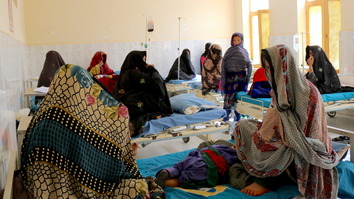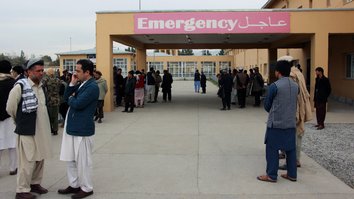KABUL -- The Taliban have closed 54 health centres in Uruzgan Province, leaving hundreds of thousands of residents without access to health care, according to local residents and Afghan officials.
Of the 59 health centres in the province, 54 have been shut down because of Taliban threats, according to Dost Muhammad Nayab, a spokesman for the Uruzgan governor.
"The Taliban have banned doctors and other medical staff from doing their work and does not allow them to enter hospitals and health clinics," he told Salaam Times.
"The Taliban also have warned the province's Public Health Department that [the Taliban] will never reopen these health centres if [the province's officials] do not comply with [the Taliban's] wishes," he said.
![Afghan National Army (ANA) soldiers patrol the Kandahar–Uruzgan highway last October 16. The Taliban have shuttered 54 health centres in Uruzgan Province in an attempt to extort funds from health administrators and to force provincial officials to set up clinics in areas under insurgent control. [Javed Tanveer/AFP]](/cnmi_st/images/2017/10/03/9858-000_h708p-585_329.jpg)
Afghan National Army (ANA) soldiers patrol the Kandahar–Uruzgan highway last October 16. The Taliban have shuttered 54 health centres in Uruzgan Province in an attempt to extort funds from health administrators and to force provincial officials to set up clinics in areas under insurgent control. [Javed Tanveer/AFP]
The Taliban's motives are purely avaricious, Nayab said.
"All health services in Uruzgan are provided by Afghan Health and Development Services, which is funded by Afghanistan's international benefactors," he said. "By shutting down health facilities, the Taliban want to exert pressure on the institution so that it will be forced to pay them ransom."
The Taliban's closure of health facilities is also an attempt to force the local government to set up more clinics in insurgent-held areas, apparently to treat insurgents, say authorities.
"We were in the clinic when a number of armed men came in and asked us to give them the keys and told us we could no longer stay there," Ehsanullah, a doctor based on the outskirts of the provincial capital, Tirin Kot, told AFP.
Using health care as tool of war
Khan Agha Miakhil, director of Uruzgan's Public Health Department, slammed the Taliban for using health care as a tool of war.
"No group involved in a war has the right to prevent medical care," he told Salaam Times. "Contrary to all legal and human rights standards ... the Taliban have shut down 54 hospitals and health clinics, denying 250,000 Uruzgan residents access to health services."
"Currently, only the central hospital in Tirin Kot is active and residents of areas near Tirin Kot continue to go to that one hospital," he said. "Because of the increasing number of patients, however, problems and issues may arise with the delivery of health services."
"The Taliban demand that surgical services become available in such districts as Khas Uruzgan and Charchino, which are under their control," Miakhil said. "They also want to be in charge of recruiting health workers, [and] they want only those approved by them to work in polio vaccination departments."
While the World Health Organisation (WHO) is trying to fill the gaps in healthcare services with mobile clinics, David Lai, health cluster co-ordinator at WHO Afghanistan, admits that such clinics cannot reach everyone in need.
"When the normal standard health facility closes and there's nothing else, the whole district is left without health care," Lai told AFP, estimating that two million Afghans have been affected this year.
"Health care should not be part of conflict," he said.
Citizens recount hardships
"My 16-year-old son had a severe illness," Nazar Mohammad, 48, a resident of Deh Rahwood, Uruzgan Province, told Salaam Times. "One day I had to take him to a clinic for treatment. Unfortunately, all the clinics had been closed except for one."
"Doctors and personnel of that one open clinic, however, had not shown up for work out of fear of the Taliban," he said.
"The lack of security and threats made by the Taliban are significant," said Mohammad, who journeyed to Tirin Kot with his son. "After two days, I was finally able to transfer my son to Tirin Kot's central hospital."
After the Taliban closed his local health clinic, Charchino District farmer Haji Fazel Ahmad was forced to rent a car to drive his sick wife to a hospital six hours away. To his dismay, the insurgents had shut that hospital too.
"There were no health services available, so I spent 2,500 AFN ($37) on a car fare to Tirin Kot, but unfortunately the situation is no better," Ahmad told AFP.
The farmer had to borrow more money to rent another car to drive to Kandahar city in hopes of finding treatment for his ailing wife.
"The people of Uruzgan have always been the ultimate victims of the Taliban's activities," Abdul Rahim Khan, a tribal elder in Uruzgan, told Salaam Times. "This time, too, only the civilian population [as opposed to troops] has suffered losses due to the closure of hospitals."
"The Taliban have been threatening tens of thousands of lives in our province," he said. "We call on the Taliban to reopen hospitals, to allow doctors to continue their work in treating patients and not to further victimise civilians for their personal demands."
Government efforts to reopen health centres
The Ministry of Public Health has confirmed the Taliban's closure of health facilities in Uruzgan Province, saying that efforts are under way to reopen them.
"The Taliban have shut down most health facilities [in Uruzgan]," Waheed Majroh, a ministry spokesman, told Salaam Times.
"The Ministry of Public Health, in co-operation with the government, tribal elders and religious scholars, is hard at work to reopen the closed health centres," he said.
"We ask all groups involved in war not to utilise the health sector as a means to achieve their political and military demands," Majroh said.
"We are legally obligated to provide equal services to all citizens of Afghanistan, and we are ready to provide residents of all regions of Afghanistan with health services," he said.

![An injured Afghan man receives treatment in Kandahar May 9, 2016, a day after a car accident. The Taliban's closure of health facilities in Uruzgan Province in September left 250,000 residents without access to local treatment. [Javed Tanveer/AFP]](/cnmi_st/images/2017/10/03/9857-000_ad0pi-585_329.jpg)






